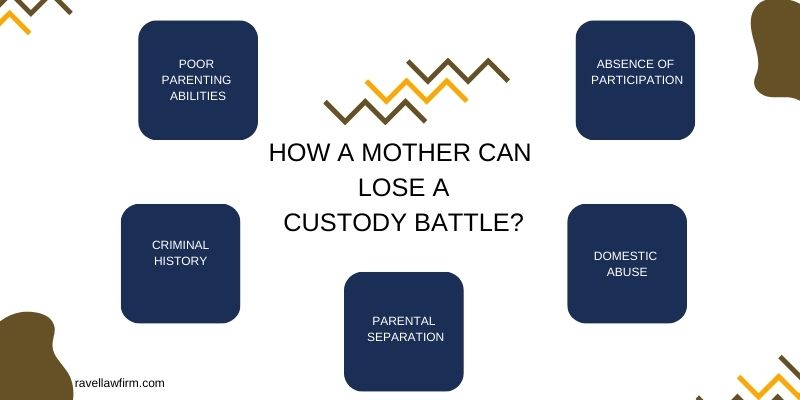Any parent who loses a custody dispute may be devastated, but mothers may experience special difficulties in court. There are several reasons why a mother may lose custody, ranging from not considering their child’s best interests first to having a history of drug dependence or issues with mental health. In this article, we’ll look at a few typical scenarios in which a mother can fail a custody dispute.

How a Mother Can Lose a Custody Battle?
It can be difficult and upsetting for a mother to lose a custody dispute. But there are a number of things that might lead to a woman losing custody.
1. Poor Parenting Abilities
A woman may lose custody of her children if she is unable to show that she can give them a secure and loving environment. This could be due to a history of neglect or mistreatment, struggles with drugs or alcohol, or concerns with her mental illnesses that limit her capability to take care of her kids.
2. Absence of Participation
A mother may not be the ultimate choice for custody if she does not fully engage in her children’s lives or does not prioritize their requirements and well-being first. This can be skipping school functions, neglecting to participate fully in their healthcare, or refusing to offer dependable emotional comfort.
3. Domestic Abuse
A mother’s history of domestic abuse may be a key consideration in a custody dispute. Even if the children were not the target of the violence, it might be inferred that the mother is unable to give the kids a secure environment.
4. Parental Separation
It can be assumed that a mother is not operating in the children’s best interests if she purposefully sabotages their bond with their father or other caregivers. Making negative remarks about the other parent, hindering with visitation or communication, or urging the kids to shun the other parent are all examples of this.
5. Criminal History
It can be proven that a woman is unfit to have custody if she has a criminal history, especially if the convictions involved child molestation, negligence, or danger.
People Also Asked: Can You Lose Custody For Not Co Parenting?

Can a Mother Lose Custody for Not Having a Home?
A mother’s lack of a permanent home or stable living situation can be taken into account while determining custody, but it does not entail that she will immediately lose custody of her kids. When deciding who should have custody of a child, family courts favor the child’s best interests. They frequently take into account a number of factors, such as each parent’s capacity to maintain a secure environment at home, their financial capacity, and their ability to satisfy the child’s developmental, psychological, and physical needs.
The court may order a mother to take action to remedy the problem if she is unable to give her children an appropriate environment, such as finding a secure place to live or enrolling in therapy or other facilities. It is uncommon for parents to lose custody of their children merely because of housing instability, and courts frequently consult with both parents to reach an agreement that is in the child’s best interests.
Can Good Mothers Also Lose Custody?
Regrettably, there are some circumstances where even good mothers could potentially lose custody of their kids. Being a good mother is undoubtedly a key consideration in custody decisions, but it is not the only one. When deciding who will have custody of a child, family courts take into account a variety of variables, such as the parents’ capacity to maintain a secure and orderly home environment, their financial resources, and their capacity to support the child’s developmental, emotional, and physical requirements.
A mother may be at danger of losing custody if she has a background of substance misuse, domestic abuse, negligence, or other problems that could endanger the kid. In certain circumstances, the mother’s own psychological health or parenting abilities might also be questioned.
It’s crucial to remember that custody determinations are made on an individual basis based on the unique conditions of each family. But, even competent mothers might encounter difficulties during custody disputes and may need to collaborate with their lawyers to present a convincing argument to the judge.
Father Trying To Take Custody From Mother
A father attempting to take custody from the mother is a scenario that might occur in family law disputes. In such circumstances, the father may claim that he is more suitable to serve as the child or children’s primary caregiver. He might point to things like the mother’s incapacity to maintain a secure home environment, her financial instability, or her incompetence to care for the child’s physical or emotional demands.
In contrast, the mother may contend that she is the superior caregiver, pointing to their intimate bond, her capacity to meet the child’s needs, and any other pertinent circumstances.
The court will end up deciding based on what is in the child’s best interests, keeping in mind all pertinent circumstances and the arguments made by both parties.
Related Article: Things Often Overlooked In Divorce Agreements
FAQ’s
How do you lose a custody battle?
If you have a past of domestic violence, negligence, or drug dependence, or if you lack the ability to give your child a secure and stable environment at home, you may lose your custody case. Additionally, it may occur if the other parent can show that they are more qualified to satisfy the child’s requirements.
On what grounds can a mother stop access?
If a court has granted the mother sole custody and authority over visiting, or if the father runs the risk of damage to the kid, the mother may limit access. Yet, blocking access without a valid legal reason may have legal repercussions.
Are custody battles hard?
Indeed, custody disputes may be emotionally and financially expensive, and they can affect both the parents and the child involved.

Hi, I’m Brian Gary; I have my Doctor of Juridical Science (SJD) degree from SMU Dedman School of Law in Dallas. Over the years, I have dealt with many families and successful corporate Legal cases. I have counseled many people on legal matters, and along with my profession, I write about Law on my blog. Please feel free to contact me for counseling/case discussion; I’ll be happy to help you.